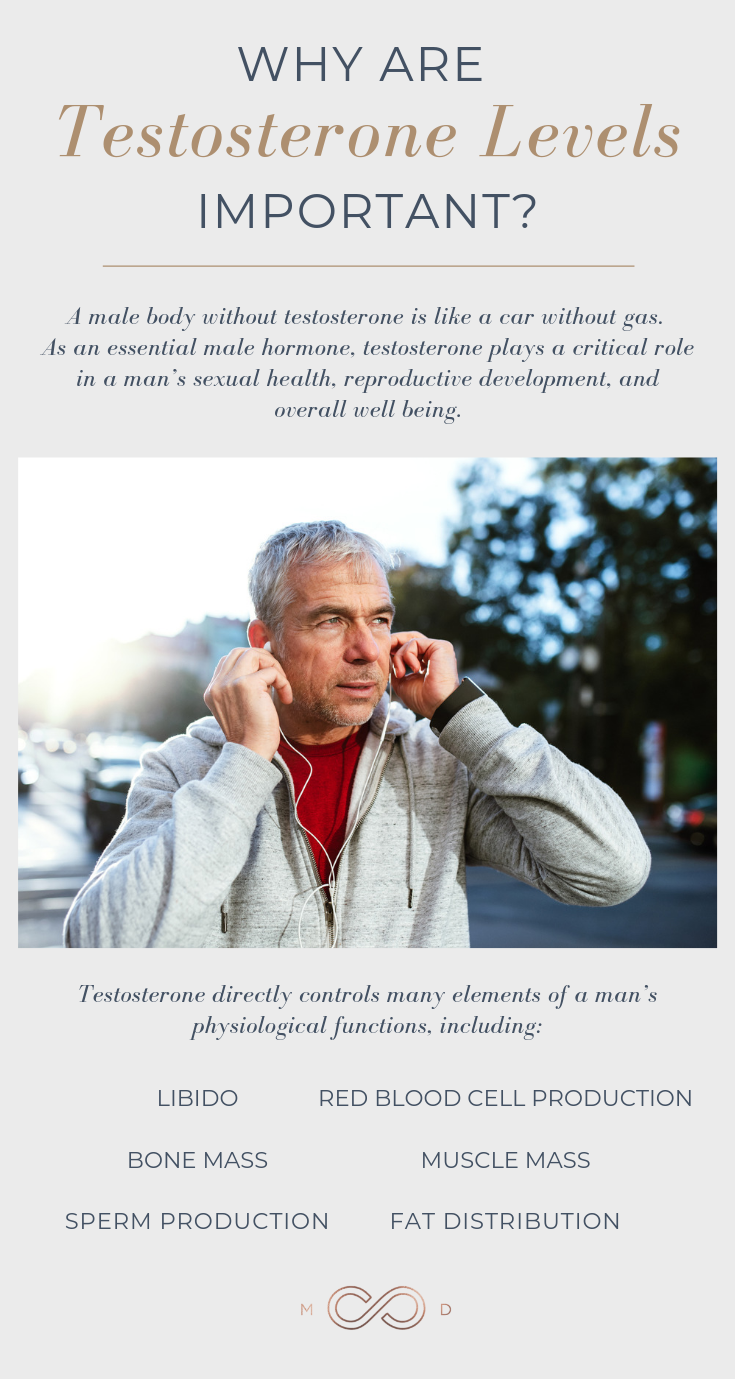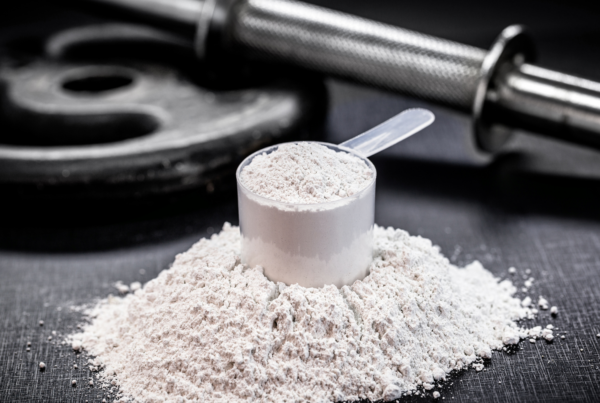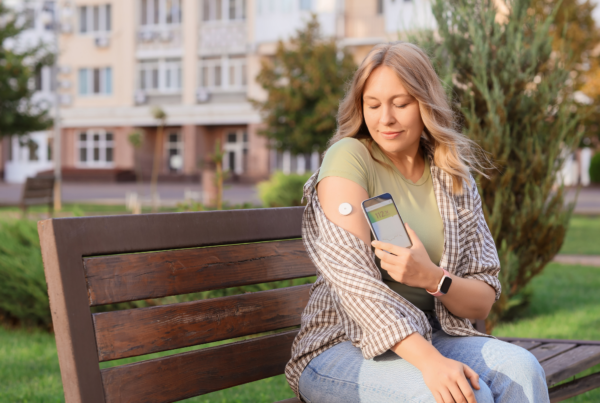According to the old birthday joke, you’re “over the hill” after your 50th birthday.
But why do we assume this milestone is an old age prison sentence? Why should living an active and fulfilling life slip out of reach after your 50th or 60th birthday?
Thanks to the convergence of incredible technologies and scientific breakthroughs, 90 is the new 60. Being “old” in 2019 is not what it used to be. We want to live longer, feel better, and take advantage of every minute we’re given.
So forget about being “over the hill”. You can add three decades of vibrant living to your life story just by optimizing your health. Bioidentical testosterone therapy for men is one of the core components of optimal health, especially for men over 40.
If you’re committed to living your best life, testosterone therapy may be the key.
What Are Bioidentical Hormones?
Bioidentical hormones offer a solution for men suffering from low or suboptimal testosterone levels. These hormones mimic your body’s natural testosterone hormones right down to their chemical composition. Unlike traditional hormone therapies that are made from synthetic ingredients, bioidentical hormones are produced from natural plant components.
Bioidentical hormone replacement therapy (BHRT) is designed to recalibrate your body’s hormone levels. Restoring testosterone levels back into optimal range achieves significant therapeutic benefits. Above all, BHRT makes it possible to coordinate the body’s most important functions and improve your wellbeing.
The true value of bioidentical hormone replacement therapy has never been more evident than in the case of one of my patients, a veteran police officer. This patient spent his entire career performing at maximum capacity. He was the first officer in the gym each morning and the last to leave each night. His accolades spoke volumes about his drive and motivation.
However, by the time this patient walked into my office after his retirement from the force, he had lost himself. He hadn’t just gained weight; he was depressed and distracted. After thriving his entire adult life, this police officer had surrendered to the effects of poor physical and mental health.
I’ve been working with him for about a year now to incorporate bioidentical testosterone therapy into his treatment plan. The results demonstrate the incredible effects of optimal testosterone on the male body. His physical and mental health are unrecognizable from the man who walked into my office a year ago. This patient has rediscovered his vitality, energy, and purpose once again.
Is Testosterone Therapy for Men Safe?
This is the most common question I receive from patients: Is testosterone therapy safe? It’s a great question to ask, and the answer is easy to give. Yes, testosterone therapy for men is safe and effective. I speak not just from my experiences with hundreds of men who have restored their health with BHRT, but from the rock-solid research on this therapeutic treatment.
What Does the Research Say?
Testosterone replacement therapy is sometimes questioned since its older and more traditional applications can cause unwanted side effects. It’s important to distinguish these methods from today’s customized bioidentical hormone replacement methods.
The most trusted medical journals and organizations have published extensive research documenting proof of the safety of testosterone therapy for men.
Mayo Clinic
The Mayo Clinic published a lengthy report in 2015 responding to studies that questioned BHRT’s correlation to cardiovascular disease. This report investigated every study performed between the years 1940 and 2014 with keywords like testosterone, androgens, cardiovascular, stroke, heart attack, and death.
Out of hundreds of studies, only four suggested an increased risk of cardiovascular disease for people optimizing with bioidentical testosterone. Of those four studies, three were discredited by serious methodological issues.
In contrast, several dozen studies reported beneficial effects of normal testosterone levels on cardiovascular risks and mortality. Testosterone therapy for men is actually associated with reduced obesity, fat mass, waist circumference, and improved glycemic control.
NIH
The National Institutes of Health publishes a study in 2015 titled “Testosterone Replacement Therapy a Cardiovascular Risk: A Review”. It concluded that no existing data supports a causal role between bioidentical hormone therapy and adverse cardiovascular events. On the contrary, the NIH explained that BHRT is an effective treatment “when hypogonadism is properly diagnosed and replacement therapy is correctly performed.”
AACE
Along with the NIH and Mayo Clinic, the American Association of Clinical Endocrinologists also released a position statement on testosterone therapy for men. It concluded that as long as men receive proper diagnostic evaluation for low testosterone and receive treatment from an experienced clinician, BHRT does not present a health or safety threat. In fact, it concludes by stating, “Testosterone therapy can provide significant benefits for hypogonadal men.”
EMA
The European Medicines Agency is the European version of the FDA. It also asserts that “no consistent evidence of an increased risk of heart problems with testosterone medicine” exists. The EMA thoroughly reviewed all available research and data before releasing its statement.
Why Does Testosterone Matter?
A male body without testosterone is like a car without gas. As an essential male hormone, testosterone plays a critical role in a man’s sexual health, reproductive development, and overall well being. This explains why testosterone is often labeled “the most necessary male hormone.”
Testosterone directly controls many elements of a man’s physiological functions:
- Libido
- Stamina
- Energy
- Drive
- Bone mass
- Red blood cell production
- Muscle mass
- Fat distribution
- Sperm production
Yet testosterone’s role isn’t strictly physical. The adult masculine brain is designed to think, function, and execute when testosterone levels are optimized. Any testosterone imbalance quickly blunts a man’s quality of life.
Believe it or not, I used to be skeptical on this topic. I doubted that testosterone therapy had any value because I was focused on the perils of obesity.
At the beginning of my career, I investigated nutritional biochemistry with an intense passion. I wanted to understand how to create environments in the body that facilitate fat elimination.
The majority of my patients benefited from what I learned. I was able to help them control their biochemistry to lose weight and build muscle. Yet a few patients remained stuck without any signs of progress.
They were doing everything right but couldn’t gain any momentum. There had to be another hormone responsible for their issues. As it turns out, that hormone was testosterone- or a lack thereof.
Due to its broad range of responsibilities in the body, testosterone is intimately involved with lean mass preservation, elimination of visceral fat, weight loss, and so much else. Even with the best exercise and eating habits in the world, my patients couldn’t get healthier. Low testosterone levels were holding them back.
 Being “Normal” Doesn’t Make You Healthy
Being “Normal” Doesn’t Make You Healthy
The more I learned about bioidentical hormones and testosterone therapy, the more I discovered that our country’s entire disease management protocol is misaligned. We maintain a dangerous “all-or-nothing” mentality. Your doctor says you either have diabetes or you don’t. You have cancer or you don’t. But disease isn’t black and white! It isn’t so simple.
The truth is that you don’t wake up one day with a disease. Chronic conditions develop progressively over time. They only pose severe threats to your life and wellbeing when the warning signs are overlooked or ignored. Reassuring yourself that you’re “normal” creates a false sense of security that may allow you to ignore telltale symptoms of a serious problem.
When it comes to testosterone, very low levels are easy to identify. The real breakthrough comes in identifying low testosterone levels that are technically “normal” and asking yourself, “is this optimal?” Even if your bloodwork shows testosterone levels (or blood sugar levels, or cholesterol levels) that are technically okay, they won’t stay that way for long.
Think of it this way: is driving a car at 25 mph normal? Sure, it’s normal if you’re in a school zone or parking lot. Once you hop on the highway, however, driving 25 mph is unacceptable. You’ll either take two hours to get across town, or you’ll get run over by the vehicles behind you.
Your low or borderline “normal” testosterone levels force your body to go 25 mph on the highway. They are restricting your optimal health and diminishing your quality of life.
The Importance of Optimal Testosterone Levels
Loss of testosterone doesn’t occur overnight. A man doesn’t go to sleep with a thriving sex drive and wake up overweight and sluggish. Testosterone levels fade gradually, beginning in a man’s late twenties or early thirties. By the age of forty and fifty, it’s impossible to ignore the effects of diminishing testosterone.
If you can relate to any of the following symptoms, especially after the age of thirty, you could be suffering from low testosterone:
- Weight gain, especially in the stomach and chest
- Decreased muscle mass
- Sleep disturbances and fatigue
- Depression, anxiety, and irritability
- Lack of mental focus and brain fog
- Decreased libido and erectile dysfunction
- Diminished energy and overall vitality
Optimal testosterone levels give you a way to slow the aging process and regain your vitality. Work with an experienced doctor who customizes your testosterone replacement therapy to your exact testosterone levels. It won’t take long for your health to be transformed.
Testosterone Levels: Know Your Numbers
Testosterone exists in a few different forms in the male body. Total testosterone, also known as serum testosterone, provides an overall testosterone count profile. Free testosterone, on the other hand, accounts for the 2% of testosterone that’s active in the body.
There is no one-size-fits-all formula for testosterone replacement. It’s essential to work with your doctor to evaluate your free testosterone levels and explore your optimal levels based on your body’s unique responses and feedback. Once you and your physician identify your optimal testosterone range, you can expect to enjoy many of these results:
- Increase in sexual desire and performance
- Natural antidepressant effects
- Reduction in visceral fat
- Increase in lean mass
- Decreased risk of heart attack and stroke
- Lower risk of Alzheimer’s disease
- Enhanced cognitive function and concentration
- Improved energy and drive
If one natural therapy can transform your life to this degree, it’s certainly something worthy of your pursuit!
The Bottom Line
This is a life-changing topic, but it’s not always easy to discuss. Have you suffered for years in silence or wondered over and over, Is testosterone safe for men? Trust me when I say that you’re not alone!
I feel compelled to help the men who feel ashamed to talk about low testosterone or don’t know the safe place to have this conversation. This may be the most important discussion that men over 40 need to have with their physicians. Fatigue, lack of drive, diminished libido, and brain fog shouldn’t be ignored.
Remember, normal isn’t the same as optimal. Bioidentical hormone replacement therapy gives you a safe and natural way to restore your body’s vibrancy and add impactful years to your life. If you begin your journey to optimized hormone levels now, imagine the transformation you can achieve.
For more information on testosterone therapy, check out Is Testosterone Therapy Safe For Men? on the Future of Medicine Podcast.

Dr. Aaron Wenzel is a concierge physician specializing in the care of fast-moving entrepreneurs, executives, and public figures in the Nashville, TN area. Dr. Wenzel’s diverse life experience and extensive training in family medicine, emergency care, nutrition, and hormone replacement therapies give him the unique platform to provide unmatched care for his patients.








Thanks, Doc! This is helpful for our next conversation.
Absolutely my pleasure — I’m glad it helped!